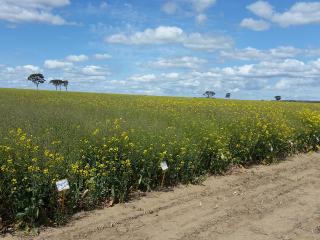New hybrid canola varieties were the stand out achievers in the 2016 National Variety Trials (NVT), comparing well to the performance of the popular open pollinated varieties sown in Western Australia.
The long term NVT results have just been updated by the Australian Crop Accreditation System, produced with support from the Grains Research and Development Corporation.
Department of Agriculture and Food canola development officer Jackie Bucat said the new triazine tolerant (TT) hybrid varieties performed well in the long 2016 season.
Ms Bucat said the TT hybrids out-yielded the popular open pollinated (OP) TT variety, ATR Bonito, which comprised 38 per cent of canola plantings in 2016.
“InVigor T4510 was the top yielding TT hybrid variety of 2016, reaching 3.7 tonnes per hectare in trials at Bolgart, Dandaragan and Greenough,” she said.
“InVigor T 4510 had the highest long-term predicted yields of the longer season NVT trials, while Pioneer 44T02 ranked the highest yield of the shorter season NVT trials.
“In the one to two tonne yield group, the predicted yields of the new hybrid varieties InVigor T4510 and Pioneer 44T02 were 14-16pc greater than ATR Bonito, albeit both with a lower oil concentration.”
Ms Bucat said growers thinking of sowing TT hybrid varieties should consider the additional financial risk from increased investment in seed and the elevated production risk from using lower seeding rates.
“Farmers expecting more than 1.5-2t/ha may find TT hybrids give a profitable return of $2 profit for each seed dollar invested, compared with OP RR varieties,” she said.
“The new hybrid varieties InVigor 45T10 and Pioneer 44T02 were profitable in the lower yield range of 1.5t/ha, while Hyola 559 TT needed yields of 1.9t/ha to meet the return target.
“However, in environments yielding less than 1.5t/ha, NVT results show that the TT hybrids are not likely to return $2 profit for each seed dollar. In these cases, OP TT varieties are more suitable.”
OP TT varieties are currently the most popular in Western Australia and comprised 71pc of canola plantings in 2016.
“Monola 416TT was the highest yielding OP TT variety in 2016 NVT trials, but in the long term MET NVT data, ATR Mako is the top yielding OP variety,” Ms Bucat said.
Of the Roundup Ready (RR) varieties, the longer season varieties Pioneer 45Y25 and Nuseed GT-53 produced the highest yield in 2016.
In the long term MET analysis, Nuseed GT-53 was the highest ranked variety of the longer season environments, while Pioneer 44Y24 was highest ranked for the shorter season environments. The versatile Pioneer 43Y23 was the second ranked variety over both environments.
In the imidazolinone tolerant (IT) varieties, Pioneer 44Y90 produced the best yields and oil content across all environments in 2016 and was the highest ranked variety in the long term MET analysis.
Ms Bucat also analysed the best canola to grow in a weed free environment, which found OP TT were the most profitable option in regions expecting less than 1t/ha.
“At yields over 1t/ha, the Clearfield hybrid Pioneer 44Y90 was found to be the most profitable,” she said.
“TT hybrids were the next most profitable option for yields of more than 1.5t/ha. Although the predicted yield for the RR hybrid GT-53 RR was higher than TT hybrids, the profit margin was reduced by the technology fee and the GM discount.”
Ms Bucat said growers should pay careful attention to the anticipated yield for their environment and its weed control status when selecting canola varieties.
“If seed is available, farmers in high yielding situations could consider growing Clearfield hybrids, provided good weed control is possible, or TT hybrids,” she said.
“RR hybrids are best suited to areas where weed control offered by glyphosate is required, while OP TT varieties are the best option in all other situations.”
More information is available at NVT online and in the Canola Variety Guide 2017 found on the department’s website.

Media contacts: Jodie Thomson/Megan Broad, media liaison +61 (0)8 9368 3937
